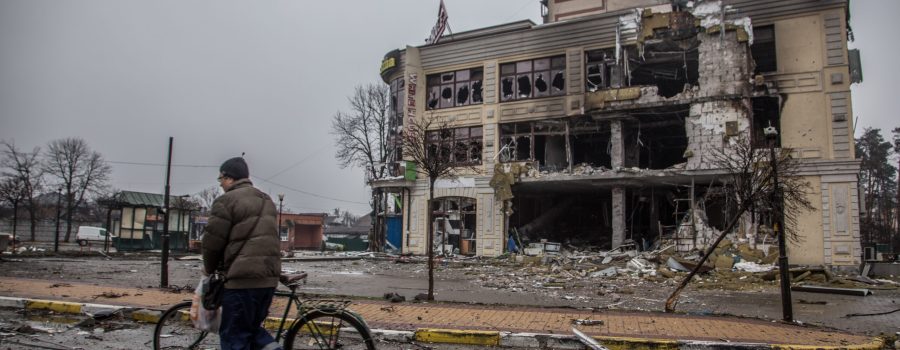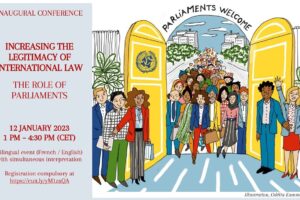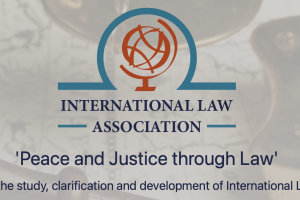ABILA Members’ Analysis and Commentary on the War in Ukraine
The American Branch includes among its members some of the leading international law experts in the world. They have published extensive commentaries on the involving situation regarding the war in Ukraine.
Chimène Keitner, co-published a three-part Q&A series with Zoe Tatarsky on Just Security. The first, Next Steps in Ukraine’s Application to the ICJ, analyzes the ICJ’s jurisdiction in relation to the Genocide Convention and the plausibility threshold, which the Court has stated must have a “link between the rights claimed and the provisional measures requested.” The second addresses Ukraine at the International Court of Justice, Russia’s Absence & What Comes Next and notes the Russian Federation’s submission as noteworthy in that Russia is seemingly taking the case seriously enough to respond. However, this raises the following questions: Who are its arguments for? Does Russia genuinely intend to convince the ICJ? The international community? The final article, The ICJ’s Order on Provisional Measures in Ukraine v. Russian Federation, analyzes how the Court, in its provisional measures, used language that was in some respects broader and other respects narrower than the language in Ukraine’s request. The Court’s order itself emphasized that “the measures to be indicated need not be identical to those requested.”
ABILA President Leila Nadya Sadat, along with Kip Hale, co-published an article on Just Security on How International Justice Can Succeed in Ukraine and Beyond. The authors note that the unprecedented interest in justice for Ukraine has exposed weaknesses in the global justice system to a much larger audience, and underscored that international institutions, including the International Criminal Court, can only be as strong as the commitment of the States supporting them. Achieving accountability for atrocity crimes in Ukraine, while also bolstering the field’s overall effectiveness and legitimacy, is attainable, if the international community approaches the problem with that goal in mind. To this end, State Parties to the ICC and those that are not, including the United States, should pursue a combination of innovative and long-overdue improvements. They suggest three ways in which efforts to ensure accountability for the ongoing crimes in Ukraine can be strengthened and the world’s fledgling international justice system can be bolstered.
ABILA Co-Director of Studies Jennifer Trahan published The Need to Reexamine the Crime of Aggression’s Jurisdictional Regime on Just Security. She observed that “the International Criminal Court (ICC) lacks jurisdiction to investigate or prosecute the crime of aggression” committed in the territory of Ukraine and argues that “[w]hat is needed in the long run is for States Parties to the ICC’s Rome Statute to amend the crime of aggression’s jurisdictional regime and create more jurisdiction in support of the core norm in the UN Charter against the aggressive use of force, Article 2(4).” She also wrote an ASIL Insight on Revisiting the History of the Crime of Aggression in Light of Russia’s Invasion of Ukraine.
ABILA Board Member Milena Sterio published an article on IntLawGrrls entitled, Russia v. Ukraine: The Limits of International Law. Sterio states while international law contains clear legal norms to condemn Russia’s invasion of Ukraine and theoretically impute state responsibility onto Russia and individual criminal responsibility on Vladimir Putin, it remains limited in its ability to address the conflict. Her reasoning is threefold: 1) Authorization for the use of force against Russia remains deadlocked in the veto-blocked Security Council; 2) the crime of aggression has a limited jurisdictional regime and because Russia is not a member of the ICC, Russian leaders are effectively shielded from accountability at the ICC; and 3) while the ICJ could order Russia to cease using military force in Ukraine, it lacks an enforcement mechanism to enforce its own judgment. Sterio asserts that due to its status as a Great Power, Russia benefits from international law’s institutional design and may remain insulated from international law’s reach despite violating fundamental international law norms.
ABILA President-Elect Michael Scharf and Milena Sterio discuss the Ukraine Invasion with Sandy Hodgkinson, Paul Williams, and Avidan Cover in a new audio video entitled Talking Foreign Policy—The Ukraine Crisis, available online. The experts discussed Russia’s strategy and tactics, such as deception, in their invasion of Ukraine as well as the west’s response to the invasion with crippling sanctions and Russia’s response with implied threats to use nuclear and chemical weapons. They also contemplated whether or not the responses have generated enough deterrence for other geopolitical contexts to refrain from similar actions. The experts then examined avenues for holding Russia and Vladimir Putin accountable for war crimes, crimes against humanity, crime of aggression, and genocide through international and domestic courts or even the creation of a hybrid tribunal.




